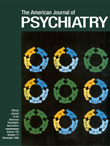Senile Degeneration and Cognitive Impairment in Chronic Schizophrenia
Abstract
Objective:This study was an investigation of the role of Alzheimer-type senile degenerative abnormalities in the cognitive impairment of chronic schizophrenia.Method:The study group comprised 145 deceased elderly institutionalized psychiatric patients: 66 with schizophrenia, 26 with mood disorders, 36 with dementia, and 17 with other psychiatric diagnoses. The comparison group included 16 deceased elderly individuals without neurologic or psychiatric disease. Psychiatric diagnoses and cognitive status were established by standardized review of medical records. Neuritic senile plaques and neurofibrillary tangles were identified immunohistochemically and counted, by investigators blind to clinical information, in standardized regions of each brain.Results:Of the subjects with schizophrenia, 68% had definite cognitive impairment, but only 8% satisfied neuropathological criteria for Alzheimer’s disease. Among the schizophrenia subjects without Alzheimer’s disease, definite cognitive impairment was associated with higher levels of plaques and tangles. The schizophrenia subjects without definite cognitive impairment had fewer plaques and tangles than the unimpaired nonpsychiatric subjects. Conclusions:Most cases of cognitive impairment in schizophrenia could not be attributed to Alzheimer’s disease. An association of mild Alzheimer-type pathology with definite cognitive impairment was unique to schizophrenia. Enhanced sensitivity to the effects of aging on the brain may be a manifestation of diminished cognitive reserve in schizophrenia. Am J Psychiatry 1998; 155: 1536-1543



